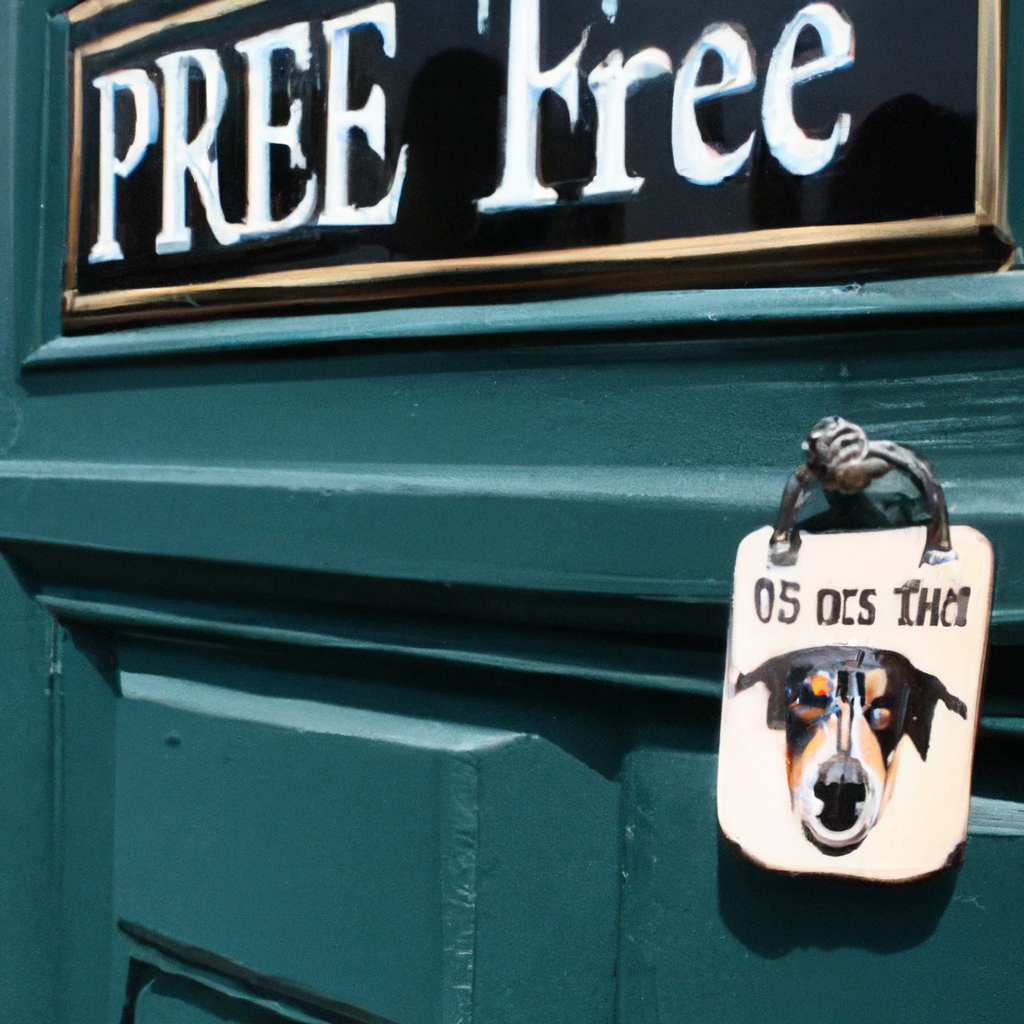Have you ever wondered if you can bring your furry companion with you when dining out in New Jersey? Well, the answer might surprise you! This article will explore whether dogs are allowed in restaurants in the Garden State. Whether you’re a dog lover or a restaurant-goer, this information will surely pique your curiosity and provide you with valuable insights. So get ready to learn all about the rules and regulations surrounding canine companions in New Jersey restaurants!

This image is property of pixabay.com.
Dogs in Restaurants: An Overview
Dogs in restaurants have been a topic of discussion and debate for quite some time. Many pet owners desire to bring their furry companions along when dining out, while others argue that it may pose health and safety concerns. This article aims to provide an overview of the legal regulations, benefits, and considerations associated with allowing dogs in restaurants, focusing on the specific context of New Jersey.
Understanding the Laws
To grasp the intricacies surrounding dogs in restaurants, it is essential to delve into the legal landscape. Various laws and regulations govern this issue at both the state and local levels. Understanding these laws ensures that restaurant owners, dog owners, and patrons are informed of their rights and obligations.
Legal Regulations regarding Dogs in Restaurants
State Laws
The New Jersey Department of Health (NJDOH) plays a pivotal role in regulating food establishments statewide. While the NJDOH permits certain animals, such as service animals, in restaurants, it defers to federal guidelines provided by the Food and Drug Administration (FDA).
Local Ordinances
In addition to state regulations, local municipalities in New Jersey may have their own laws concerning dogs in restaurants. These ordinances can vary from town to town, so it is crucial for both restaurant owners and dog owners to familiarize themselves with the specific regulations in their area.
Health Code Regulations
Health code regulations are another significant aspect to consider when discussing dogs in restaurants. These regulations are in place to ensure food safety and prevent the spread of illnesses. It is imperative for restaurants to adhere to these guidelines while accommodating dogs in their establishments.
State Laws
NJ Department of Health Regulations
The NJDOH permits dogs in outdoor dining areas as long as certain conditions are met. Dogs must be deemed “clean and well-behaved,” and the restaurant staff must ensure that direct contact between dogs and the restaurant’s utensils, dishes, or other food-related items is prevented. Additionally, dogs must be leashed and under control at all times.
Food and Drug Administration (FDA) Guidelines
While state laws are crucial, the FDA guidelines play an essential role in determining what is permissible concerning dogs in restaurants. The FDA states that no animals, except for service animals, should be allowed in areas where food is prepared, served, or stored. This guideline acts as a foundation for many state and local regulations across the United States.

This image is property of pixabay.com.
Local Ordinances
City/Town Specific Regulations
Specific regulations regarding dogs in restaurants can differ among different cities and towns within New Jersey. Local ordinances may outline requirements for outdoor seating areas and may impose restrictions on certain breeds. It is crucial for restaurant owners and dog owners to review the ordinances in their respective municipalities to ensure compliance.
Municipal Code Provisions
Municipalities may also have provisions under their code of ordinances that further specify the guidelines for dogs in restaurants. These provisions may outline any additional requirements, such as leash length, cleanliness, and waste disposal protocols. Familiarizing oneself with these provisions is essential to maintain harmony between dog-friendly establishments and the local community.
Health Code Regulations for Dogs in Restaurants
Food Handling and Safety
In the interest of public health, restaurants need to comply with strict food handling and safety regulations. When allowing dogs in outdoor dining areas, it is essential for restaurants to take steps to prevent any potential contamination or cross-contamination of food. Proper storage and handling practices, along with continuous monitoring, are crucial to ensure the safety of the customers.
Sanitary Measures
Maintaining a sanitary environment is of utmost importance when welcoming dogs into a restaurant. Restaurants should regularly clean and disinfect outdoor dining areas, paying particular attention to areas that dogs may come into contact with. Providing ample handwashing stations for both staff and patrons is crucial to minimize the risk of any sanitation-related issues.

This image is property of pixabay.com.
ADA (Americans with Disabilities Act) Guidelines
Service Animals vs. Pets
It is essential to distinguish between service animals and pets when discussing dogs in restaurants. The ADA defines a service animal as a dog that is trained to perform tasks for an individual with a disability. These animals are protected by federal law and are entitled to accompany their handlers in areas where pets may be restricted.
Rights of Individuals with Disabilities
Individuals with disabilities who rely on service animals may face limitations in their ability to dine out if restaurants do not permit these animals. The ADA ensures that these individuals are provided equal access to public places, including restaurants, allowing them to engage in social activities without discrimination.
Accommodations in Restaurants
Restaurants are required by law to make reasonable accommodations for individuals with disabilities and their service animals. This may include allowing the service animal to be present in indoor areas, even if animals are typically restricted. These accommodations aim to create an inclusive environment and ensure that individuals with disabilities can enjoy dining experiences like everyone else.
Benefits of Allowing Dogs in Restaurants
Enhanced Customer Experience
Allowing dogs in restaurants can significantly enhance the overall customer experience. Pet owners who can dine with their beloved companions feel a sense of comfort and companionship. This in turn leads to increased customer satisfaction and loyalty, as dog owners are more likely to revisit restaurants that cater to their needs.
Increase in Revenue
Opening up established pet-friendly policies can also contribute to an increase in revenue for restaurants. Pet owners often seek out establishments that welcome their furry friends, resulting in a larger customer base and greater profitability. Furthermore, attracting dog-owning customers can lead to positive word-of-mouth recommendations, further boosting business prospects.
Positive Impact on Local Pet-Friendly Culture
A restaurant’s decision to allow dogs can have a broader impact on the community’s pet-friendly culture. By accepting dogs, restaurants promote inclusivity and compassion towards animals, fostering a welcoming environment for all members of the community. This can lead to the growth of pet-friendly initiatives throughout the region, benefiting not only dogs but also other animals in need.

Restaurant Policies on Dogs
Individual Establishments’ Discretion
While there are legal regulations and guidelines regarding dogs in restaurants, it ultimately rests on the discretion of individual establishments to allow dogs. Restaurant owners have the freedom to decide whether or not to invite dogs into their establishments, taking into consideration factors such as space availability, potential customer preferences, and local regulations.
Designated Outdoor Dining Areas
Many restaurants that allow dogs choose to designate specific outdoor dining areas where dogs are permitted. This allows for a clear distinction between pet-friendly and non-pet-friendly areas, making it easier for both dog owners and other patrons to choose seating arrangements that align with their preferences.
Dog-Friendly Menu Options
To ensure a truly dog-friendly experience, some restaurants even go the extra mile by offering specialized dog-friendly menu options. These options may include dishes made specifically for dogs or the provision of water bowls and treats upon request. Such offerings further underline the commitment of restaurants to providing a memorable experience for dog owners.
Procedures and Requirements for Dog-Friendly Restaurants
Employee Training
For restaurants that choose to welcome dogs, it is important to provide appropriate training to employees. This entails educating staff members on proper handling of dogs, maintaining a sanitary environment, and understanding the relevant legal regulations. Well-trained employees can ensure a smooth and safe dining experience for all customers, both human and canine.
Health and Safety Inspections
To maintain compliance with health and safety regulations, dog-friendly restaurants should expect regular inspections. These inspections will assess the cleanliness of the establishment, storage of food and supplies, and overall adherence to health code regulations. Restaurants must prioritize these inspections to ensure the well-being of their customers and their pets.
Identification and Leash Rules
To ensure accountability and safety, restaurants may implement identification and leash rules for dogs. Requiring dogs to wear identification tags will allow for easy identification of service animals and well-behaved pets. Additionally, maintaining leash rules within the outdoor dining areas will provide a sense of control, mitigating any potential disturbances or safety concerns.

Public Opinion and Controversies
Supporters of Dogs in Restaurants
Supporters of allowing dogs in restaurants argue that it adds to the cultural fabric of a community and enhances social interactions. They believe that well-behaved dogs can bring joy and create a more relaxed atmosphere. Additionally, supporters emphasize the importance of respecting the rights of individuals with disabilities and their service animals.
Opponents of Dogs in Restaurants
Opponents of dogs in restaurants express concerns about hygiene, potential allergies, and disruptions to the dining experience. They argue that dogs should be restricted to outdoor dining areas to minimize potential contamination and maintain a comfortable environment for all patrons. Some opponents also worry about the risk of accidents or dog-related incidents.
Compromises and Recommendations
To find common ground between both viewpoints, compromises and recommendations may be necessary. Implementing stringent health and safety protocols, clearly segregating dog-friendly areas, and accommodating service animals while adhering to local regulations can promote a harmonious coexistence within restaurants. Open dialogue and community input can also help shape regulations that balance the needs and concerns of all parties involved.
In conclusion, the issue of dogs in restaurants is multifaceted, requiring a consideration of legal regulations, health code provisions, and the desires of both restaurant owners and pet owners. When implemented thoughtfully and responsibly, allowing dogs in restaurants can enhance the customer experience, boost revenue, and contribute to a more inclusive and compassionate community. By understanding the laws, abiding by health code regulations, and engaging in open conversations, a balance can be struck that benefits all stakeholders involved while ensuring the safety, comfort, and satisfaction of every guest.


